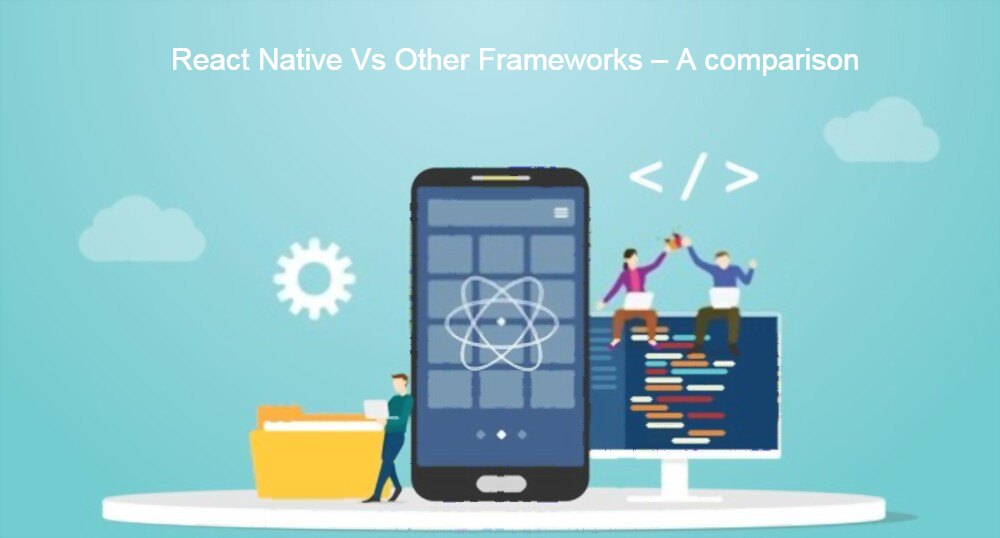
React Native is a popular cross platform framework . It is generally assumed that all cross platform frameworks are similar and the developer can choose any framework he is comfortable with. In reality, it is not so. The framework you choose has significant effects on the success of the app you develop. Is React Native the right framework for your project? To know the answer you should know what you can expect from a framework and the differences between Real Native and other frameworks. Let’s explore.
1. React Native vs Flutter
Both of them are cross platform mobile app development. They have a few similarities like
- Faster development
- Open source and free
- Easy customization and
- Easy maintenance
What are their differences?
- React Native was created by Facebook in 2013 and was released for public use in 2015 and Flutter was created by Google in 2017.
- React Native uses JavaScript built on React library. Flutter uses Dart language created by Google.
- The popular apps built with React Native are Facebook, Instagram, Skype, Airbnb, Walmart, and Shopify etc. The popular products built with Flutter are Google ads, Xianyu by Alibaba, Hamilton, Reflectly, and Watermaniac etc.
- Flutter uses the Hot Reload feature that allows easy bug fixing. React Native uses Fast Refresh. Fast Refresh is more updated and a step ahead. It has new features for bug fixing and provides a better experience for the developers.
- React Native has better community support than Flutter as there are more than 1,00,000 active contributors.
- Dart is not a common programming language. So there is a lack of support in IDEs and editors. JavaScript is a common language. So developers have the freedom to use IDEs and editors of their choice.
When is React Native a better choice?
- When you want to extend your existing apps to other platforms.
- When you want a high-responsive UI.
- When you want to build a lightweight app.
- When you want to reuse the code for desktop and mobile app development
When is flutter a better choice?
- To build a small-sized app.
- To build a platform-specific app
- To build an app that needs minimalistic UI
React Native is in a stable position and Flutter is improving.
React Native vs Ionic
Both React Native and Ionic are cross-platform mobile app building frameworks. They may sound similar but there are many differences between them.
- React Native is a native framework to build cross platform apps natively. The underlying widgets are native components. Although it is built with JavaScript, the components are native components of android and iOS. Ionic is not native but hybrid in nature. Hybrid apps will not have access to native features of the mobile device like GPS, camera, and contacts.
- React Native is written in JavaScript using React. To build ionic apps, angular or React or Vue can be used.
- The popular apps built with React Native are Facebook, Instagram, Skype, Airbnb, Walmart, and Shopify etc. The popular apps built with ionic are JustWatch, Sworkit, Honeyfi, Diesel, and ChefSteps etc.
- React Native learning curve is higher when compared to Ionic.
- React Native’s performance is better than Ionic. As ionic is hybrid, it is slower.
- React Native’s community is more active and engaging.
When to use Ionic?
- When you want an elegant UI that matches the mobile website and mobile app, you should go for ionic.
- When the development team has no experience in the native framework, ionic is the best option.
When to use React Native?
- When the development team is compiled of native developers, React Native is a better choice.
- It is preferred by consumer startups with a background of native app development.
React Native vs Kotlin Multiplatform
Like React Native, Kotlin Multiplatform is a free and open source framework for cross platform app development. Both of them have good community support as they are backed by powerful communities. What are the differences between the two?
- React Native was developed by Facebook and Kotlin Multiplatform was developed by JetBrains. Both of them are backed by big companies.
- React Native was initially designed for Facebook and Kotlin Multiplatform was initially designed for Java Virtual Machine or JVM.
- React Native is faster than Kotlin Multiplatform.
- Kotlin Multiplatform needs fewer lines of code that decreases the risk of error. Lesser code is also an advantage for developers.
- The popular apps built with React Native are Facebook, Instagram, Skype, Airbnb, Walmart, and Shopify etc. The popular companies that use Kotlin Multiplatform are Autodesk, Quizlet, Chalk, Yandex, and VMware etc.
- React Native is suitable for cross platform mobile app development. Kotlin Multiplatform is suitable for all well crafted projects and not just for mobile apps.
When to use Kotlin Multiplatform?
- When you want to make an existing project suitable for multiple platforms you should use Kotlin Multiplatform.
- When you want the app to have an expressive syntax, Kotlin Multiplatform is a better choice.
There are many more frameworks and more new frameworks are being introduced. However, React Native mobile app development is here to stay as it has many advantages and an unmatchable community support.


